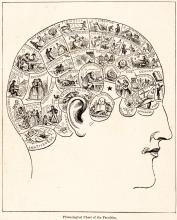Maybe numbers and graphs is your thing, or maybe it’s the big questions about language, or social causes. No matter, as far as departmental course offerings go, there’s lots to choose from.
New Courses
Language and Thought
LING 210, taught by Laura McGarrity, starts off with Benjamin Whorf’s theory of linguistic relativity, the idea that the structure of human language influences, shapes, and possibly even constrains the way we think, then examines arguments and data for both strong and weak interpretations of the hypothesis as well as opposing viewpoints. LING 210 will be offered again Spring 2022.
Data Science courses
Computational Methods for Linguists (LING 471), taught by Olga Zamaraeva Spring 2021, included such topics as data in computational linguistics, how linguistic theory and questions dictate choice of computational methods, and ethical and social implications of data uses in linguistics. Students learned basic programming concepts (using Python), as well as command-line interface, version control, techniques for data cleaning, representing data as vectors, thoughtfully choosing a model, running the model, and interpreting and visualizing results. LING 471 fulfills an elective requirement for the Data Science minor.
R for Linguists (LING 421/521), first taught by Alicia Beckford Wassink Spring 2018 and annually thereafter, also fulfills the data skills course requirement of the Data Science minor. This course introduces students to R and includes character processing, validation, summarization, and visualization of linguistic data. Students learn to work with different datatypes, and produce scripts useful to researchers in different linguistic subfields.
Introduction to Statistics for Linguists
Finally, UW linguists have a statistics class, LING 520, tailored to testing typical research questions in linguistics. Qi Cheng taught this Spring 2021 course, which covers descriptive statistics, probability, sampling, null hypothesis significance testing, t-test, correlation, simple and multiple linear regression, ANOVAs, logistic regression, tests of independence, and (generalized) linear mixed models.
Health and Wealth
The Autumn 2021 offering of HUM 101, the first quarter of a three-quarter Humanities First sequence 2021-2022, addresses Health and Wealth from a variety of perspectives. The class is taught by a team of faculty from English (Stephanie Clare), Linguistics (Naja Ferjan Ramírez), and Music History (Anne Searcy). In her part of the course, Ferjan Ramírez will teach about how childhood poverty, racial, and socioeconomic disparities affect infant brain and language development.
Proseminar for incoming graduate students
Autumn 2021 the department will launch a new seminar series, LING 599B, designed to help orient and connect first-year PhD students in Linguistics. Drawing on popular seminars taught by Edith Aldridge and Ellen Kaisse in past years, the three-quarter series will focus on student and professional development. The seminar will place considerable emphasis on promoting mental health and fostering diversity, equity, and inclusion in linguistics and beyond. Notably, the series will fulfill a key mission outlined in the department's anti-racism statement by exploring anti-racist practices in research and teaching and by raising awareness around imposter syndrome, which is known to affect underrepresented groups disproportionately. LING 599B is currently being developed by Richard Wright, Shane Steinert-Threlkeld, Qi Cheng, and Naomi Tachikawa Shapiro, and will be taught by Naomi this year. The seminar is required of first-year PhD students, but all graduate students in Linguistics are welcome to join!
